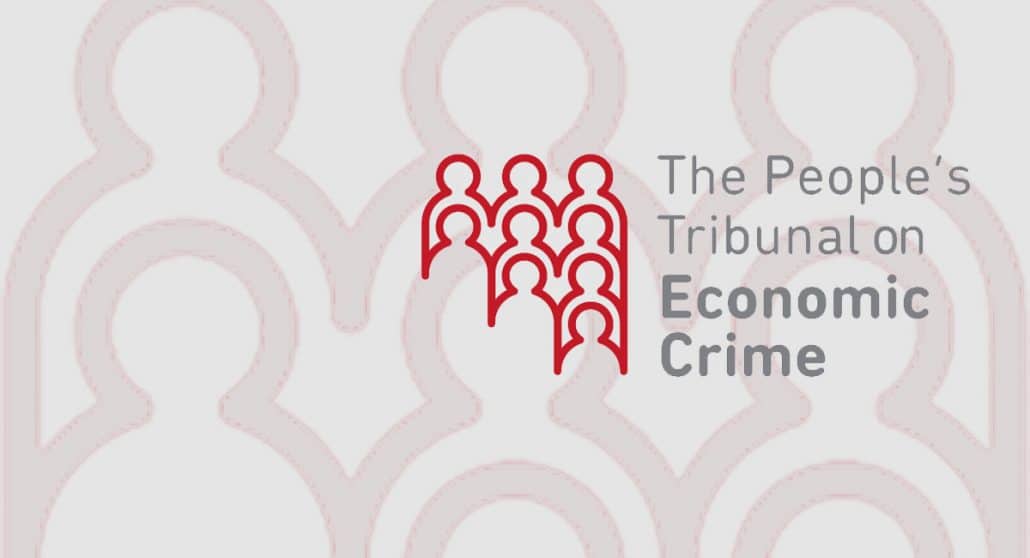The First People’s Tribunal on Economic Crime in South Africa
Delivery of Tribunal Panel’s Final Report
Venue: Women’s Jail, Constitution Hill, Johannesburg, South Africa
Date: Thursday 20 September 2018
Time: 13:00 – 14:30
____________________________________________________________
The People’s Tribunal on Economic Crime will deliver its final findings to the public at Constitution Hill in Johannesburg on 20 September 2018. This follows six months, in which implicated parties in business and government were allowed to respond to allegations of economic crimes, and in which legal arguments were prepared for deliberation by members of the Tribunal panel.
The initial hearings took place from 3 to 7 February 2018. Evidence of corruption and economic crimes relating to the South African arms trade over the past forty years – from the apartheid era to contemporary state capture – was heard. In addition, civil society groups made powerful submissions about the impact of corruption in our society. To learn more about these cases, read the Joining the Dots report put together by the Tribunal Organising Committee. [1]
Evidence at the Tribunal was heard by members of the panel, made up of legal experts and activists. The panelists are Mandisa Dyantyi, Allyson Maynard Gibson, Navi Pillay, Dinga Sikwebu, and Zak Yacoob. After considering the critical and compelling evidence brought before them, the panel made interim findings and recommendations.
The process thus far
The preliminary findings of the first Peoples Tribunal panel indicated that they had heard significant and damning evidence of alleged wrongdoing in each of the cases brought forward. As a result, the recommendations of the Tribunal panel (available here) were as follows:
- Apartheid: Foreign and domestic banks, such as Kredietbank Luxembourg, and foreign governments, such as France and China, ought to be investigated for their alleged contribution to the crime of apartheid.
- The 1999 Arms Deal: There should be a rigorous investigation into the involvement in these dealings of cabinet ministers and others in the state machinery as soon as possible.
- Contemporary ‘state capture’: A full investigation by relevant authorities should be undertaken into these allegations.
The panel further recommended that copies of the Tribunal’s interim report, along with summaries of the relevant evidence, be served to the South African government and other implicated private actors.
Thirty-eight implicated parties were given three months to respond to the evidence. The evidence was also shared with state institutions such as the National Prosecuting Authority and Department of Justice. Only one party, KBC Group (formerly Kredietbank), sent a response which is available here. The implicated parties have also been formally invited to the release of the final findings of the Tribunal panel. We sincerely hope that they attend, in order to show that they take the demands and concerns of South African civil society seriously.
The impact of the final report – 20 September 2018
The final findings of the Tribunal, though not legally binding, will contain further recommendations from the panel, based on the evidence and legal submissions made to them. The People’s Tribunal is a powerful call from civil society to demand that state and private actors be held accountable for economic crime and corruption, while highlighting the failure of state institutions to do so.
The delivery of the Tribunal’s final report on 20 September (13h00 – 14h30) is open to members of the public and the media. The event will also be livestreamed via Facebook and Periscope.
Note: For more background documentation, evidence and interim findings please visit www.corruptiontribunal.org.za.
For inquiries, please contact:
Philile Ntombela
Researcher at Open Secrets
076 776 5717
pntombela@opensecrets.org.za
Leila Khan
Research and Advocacy Intern at Open Secrets
078 567 8005
lkhan@opensecrets.org.za
[1] The organising committee consists of Open Secrets, Right to Know Campaign, Corruption Watch, Centre for Applied Legal Studies (CALS), Public Affairs Research Institute (PARI), and the Foundation for Human Rights.

